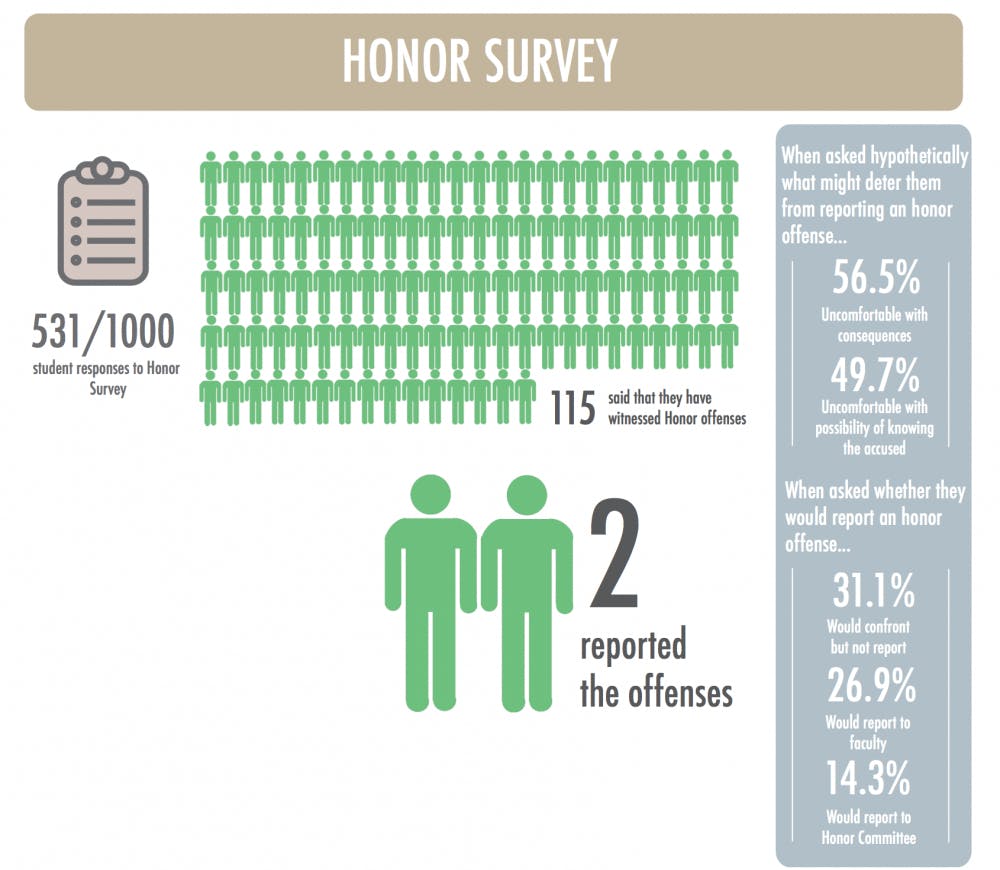A team of graduate students from the Education School presented to the Honor Committee on Sunday the results of a student survey assessing the community’s interactions with and feelings toward the honor system. The survey found a great majority of students are aware of the honor system and its procedures, but many are uncomfortable with the consequences of an honor offense and are unlikely to report those they witness.
A collaboration between student researchers and the Committee, the study began last semester and was sent to a random sample of 1,000 University students — both undergraduate and graduate, from all schools — and 531 responded. Graduate researchers sought to ascertain how responses varied among a variety of categories — including gender, race, Greek affiliation, nationality and athlete status.
Of respondents, 55.6 percent were female, 72.1 percent were undergraduates, 63.5 percent were white, 87.8 were native to the United States and 0.9 percent were Division I athletes. This data closely mirrors student demographics reported by the University’s current on-Grounds enrollment data.
An overwhelming majority — 89.5 percent of those surveyed — remembered their first-year honor system orientation and knew what constituted an honor offense. However, of the 115 students who said they witnessed honor offenses, only two reported the incidents. The two who did report the offense chose not to report it to the Committee, and instead discussed it with their professors.
The 98.3 percent of students who chose not to report a witnessed offense did so for a number of reasons. More than one-third — 35.4 percent — felt the consequences of getting convicted for an honor offense were too harsh, while 15 percent chose not to report because they knew the offender.
When asked hypothetically what might deter them from reporting an honor offense, 56.5 percent of students noted discomfort with the consequences of a conviction. Almost half, 49.7 percent, were uncomfortable with the possibility of knowing the person accused of the offense. When asked whether they would report an honor offense, 31.1 percent of students said they would confront the offender but not report them, 26.9 percent said they would report the incident to faculty and 14.3 percent said they would report to the Committee no matter what.
One area in which the study found considerable differences among demographics was perceived fairness of the honor system. Men felt 3.5 times more likely to be reported than women did, while multi-racial students felt five times more likely and African-American students felt seven times more likely to be reported than students of all other races felt.
Students who thought some groups were more likely to commit an offense than others — 36.7 percent of respondents — labeled student athletes 20.3 percent more likely to commit an offense than their peers.
In data examining actual cases, there was no considerable difference in the rate of offenses committed between genders, races or citizenships. Though athletes were recorded as eight times more likely to commit an honor offense, this was not confirmed with statistical significance in the survey.
Graduate researchers called for additional future research to help the Committee better gauge student engagement with honor. Furthermore, they said it would be beneficial to compare this study to one at a school with a multi-sanction honor system, as many University respondents felt the single sanction was too harsh.
Honor Committee Chair Nicholas Hine, a fourth-year College student, said much could be learned from this survey, but he hoped more research could be conducted in the future.
“The statistics surrounding the issue of students perceiving that they’re being disproportionately affected by the system — that to me is the most concerning,” Hine said. “We certainly learned something [but also] learned there’s more work to be done.”
Committee members hope more information will shed light on faculty reporting trends and reporting trends at other schools with different sanctioning policies. Hine said the Committee is constantly re-evaluating the honor system’s procedures and considering the merit of a single sanction system.
The study was conducted by Education School master’s degree candidates Theresa Melton and Laura Ochs, and doctoral candidates Bert Jacoby and Sarah E. Whitley. The research was performed in part for a class the four had with Education School Prof. Patrick Meyer.







